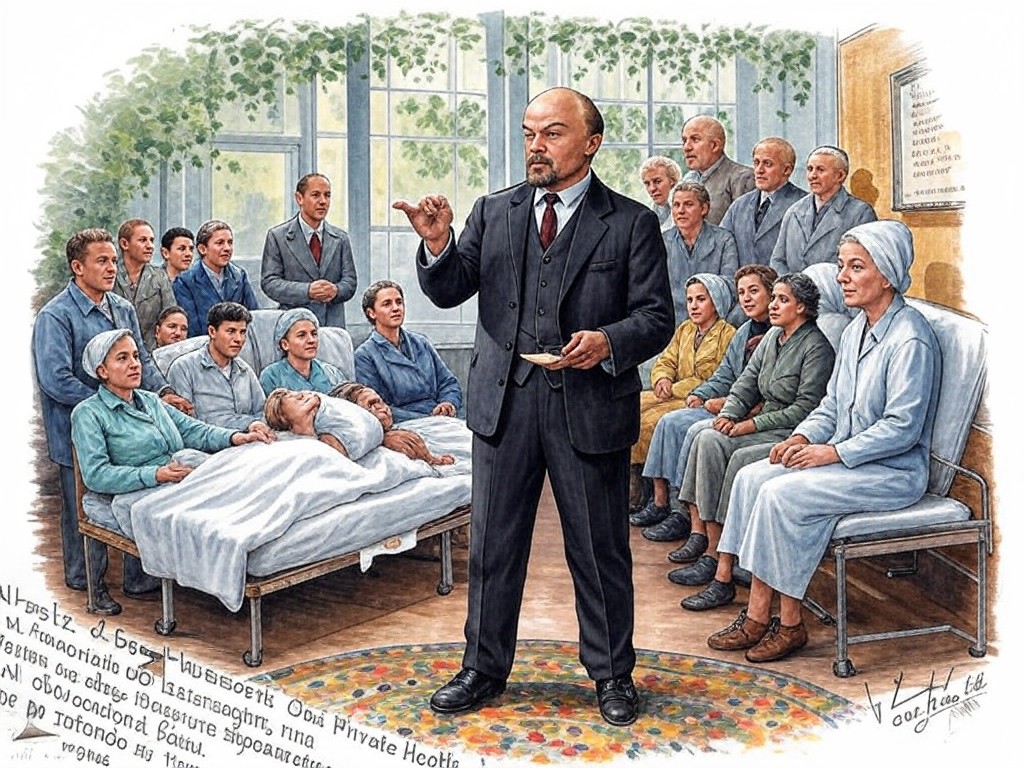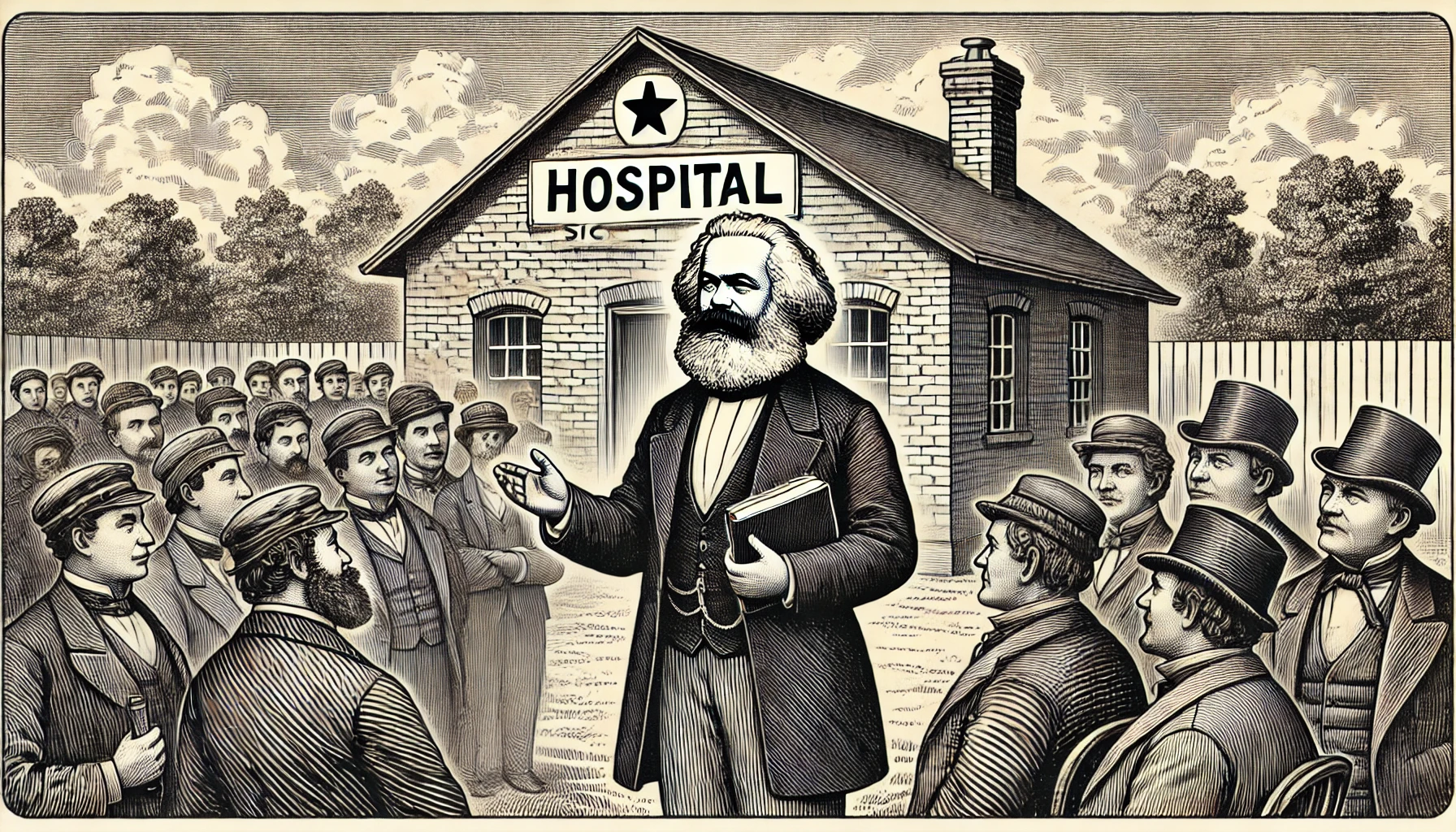Lenin and Private Health Insurance: A Revolutionary’s Perspective
Vladimir Lenin, the revolutionary architect of Soviet communism, saw capitalism as an oppressive system that perpetuated class inequality and social injustice. If Lenin were alive today, one could only imagine the fervor with which he would critique private health insurance, a system that commodifies healthcare and prioritizes profit over human well-being. For Lenin, private health insurance would represent a glaring example of capitalism’s exploitative nature—a system designed to perpetuate inequality, undermine collective welfare, and entrench class divisions.
This essay explores how Lenin’s ideas would resonate in a critique of private health insurance. Drawing parallels between his historical writings and the modern healthcare industry, it becomes evident that Lenin would view the abolition of private health insurance as essential to achieving a just and equitable society.
1. Private Health Insurance as a Tool of Exploitation
At the core of Lenin’s ideology was the belief that capitalism thrives on the exploitation of the working class. Private health insurance exemplifies this exploitation by placing healthcare—a basic human need—into the hands of profit-driven corporations.
The Profit Motive
Private health insurers prioritize profit margins, often at the expense of patient care. Policies that deny claims, limit coverage, and impose high out-of-pocket costs are designed not to improve health outcomes but to maximize shareholder returns. Lenin would argue that this profit motive reveals the moral bankruptcy of capitalism, where even human suffering becomes a commodity to be exploited.
Economic Inequality
Lenin’s critique of capitalism highlighted the widening gap between the bourgeoisie and the proletariat. In a private health insurance system, this inequality is starkly visible. The wealthy can afford comprehensive coverage and superior care, while the working class and poor struggle with inadequate insurance or lack coverage altogether. This two-tiered system reinforces the class divide Lenin sought to abolish.
2. Alienation in Healthcare
Lenin, building on Marx’s theory of alienation, critiqued how capitalism estranges individuals from their humanity and the products of their labor. In the realm of healthcare, private insurance alienates both patients and providers.
Patients as Commodities
Under private health insurance, patients are often reduced to policy numbers and profit margins. Decisions about their care are dictated by insurers rather than medical professionals, leading to frustration, mistrust, and a sense of powerlessness. Lenin would see this as a manifestation of alienation, where human needs are subordinated to financial interests.
Healthcare Workers as Tools
Doctors, nurses, and other healthcare professionals face burnout and moral injury in a system that prioritizes efficiency and profitability over patient care. Lenin would argue that this dehumanization of workers reflects capitalism’s broader tendency to commodify labor, stripping it of its intrinsic value.
3. The Historical Context of Lenin’s Healthcare Vision
Lenin’s approach to healthcare was deeply rooted in his vision of a socialist state that prioritized collective welfare over individual profit. His leadership during the early Soviet era provides insights into how he might address private health insurance today.
Abolition of Private Healthcare
One of Lenin’s first acts after the Russian Revolution was to abolish private healthcare and establish a state-run system. For Lenin, healthcare was not a privilege but a fundamental right. He believed that access to medical care should be determined by need, not wealth—a principle diametrically opposed to the ethos of private health insurance.
Focus on Preventative Care
Lenin emphasized the importance of preventative care and public health initiatives. In contrast, private health insurance often incentivizes reactive care, prioritizing expensive treatments over cost-effective preventative measures. Lenin would likely criticize this approach as wasteful and counterproductive, serving profit motives rather than public health.
4. Modern Parallels: How Lenin’s Ideas Apply Today
The systemic flaws of private health insurance mirror many of the issues Lenin identified in capitalist systems. His critiques remain strikingly relevant in understanding the challenges of modern healthcare.
Medical Debt and Financial Exploitation
In countries like the United States, where private health insurance dominates, medical debt is a leading cause of bankruptcy. This financial exploitation aligns with Lenin’s critique of capitalism as a system that preys on vulnerability and exacerbates poverty. He would argue that no one should face financial ruin for seeking medical care.
Pharmaceutical Profiteering
Lenin would likely view the partnership between private insurers and pharmaceutical companies as emblematic of capitalism’s collusion against the working class. The high cost of medications, driven by corporate greed, disproportionately impacts low-income individuals, creating barriers to essential treatments.
5. Social Media and Modern Propaganda: A Leninist Tactic
Lenin was a master of propaganda, using newspapers, pamphlets, and speeches to galvanize support for the Bolshevik Revolution. In today’s digital age, social media serves as a powerful tool for shaping public opinion. Advocates for universal healthcare and critics of private insurance leverage platforms like Twitter and Facebook to expose systemic injustices and rally support for reform.
Grassroots Movements
Lenin would likely champion grassroots movements advocating for Medicare for All or similar initiatives. These movements, which challenge the dominance of private insurers, echo Lenin’s call for collective action against capitalist oppression.
Exposing Corporate Greed
Social media campaigns that highlight the profit-driven practices of private insurers align with Lenin’s strategy of exposing the injustices of capitalism. Viral stories of denied claims, inflated costs, and medical bankruptcies serve as modern-day equivalents of the revolutionary pamphlets Lenin used to mobilize the masses.
6. Lenin’s Critique of Capitalist Reform
Lenin was skeptical of incremental reforms within capitalist systems, arguing that they often serve to placate dissent without addressing underlying inequities. In the context of healthcare, he would likely view piecemeal reforms, such as expanding access to private insurance, as insufficient.
The Illusion of Choice
Proponents of private health insurance often tout “choice” as a key advantage. Lenin would dismiss this rhetoric as an illusion, arguing that true choice is impossible in a system where economic inequality determines access to care. He would advocate for systemic change that prioritizes universal access over market-driven options.
Resistance to Revolutionary Change
Lenin recognized that entrenched interests would resist efforts to dismantle exploitative systems. In today’s context, the powerful lobbying efforts of private insurers and pharmaceutical companies represent the kind of opposition Lenin anticipated. He would call for organized, collective resistance to overcome these obstacles.
7. The Path Forward: A Leninist Vision for Healthcare
If Lenin were addressing the issue of private health insurance today, his solution would be clear: the complete decommodification of healthcare. This vision entails not only the abolition of private insurance but also the establishment of a system that prioritizes public health and collective welfare.
Universal Healthcare as a Right
Lenin would argue that healthcare should be a universal right, funded through progressive taxation and administered by the state. Such a system would eliminate the profit motive, ensuring that resources are allocated based on need rather than financial considerations.
Public Ownership of Resources
In Lenin’s vision, pharmaceutical companies, hospitals, and other healthcare institutions would be publicly owned, operating in the interest of public health rather than shareholder profit. This approach would prioritize research and development aimed at addressing pressing health challenges rather than maximizing revenue.
Conclusion: Lenin’s Enduring Relevance in the Healthcare Debate
Vladimir Lenin’s critique of capitalism provides a powerful framework for understanding the flaws of private health insurance. By commodifying healthcare, prioritizing profit over well-being, and perpetuating class inequality, private health insurance embodies the systemic injustices Lenin sought to eradicate.
While his solutions may seem radical to some, Lenin’s emphasis on collective welfare, equity, and universal access offers valuable insights for reimagining healthcare in the 21st century. As debates over healthcare reform continue, the enduring relevance of Lenin’s ideas serves as a reminder that transformative change is possible—and necessary.

Originally posted 2024-10-28 03:23:56.



